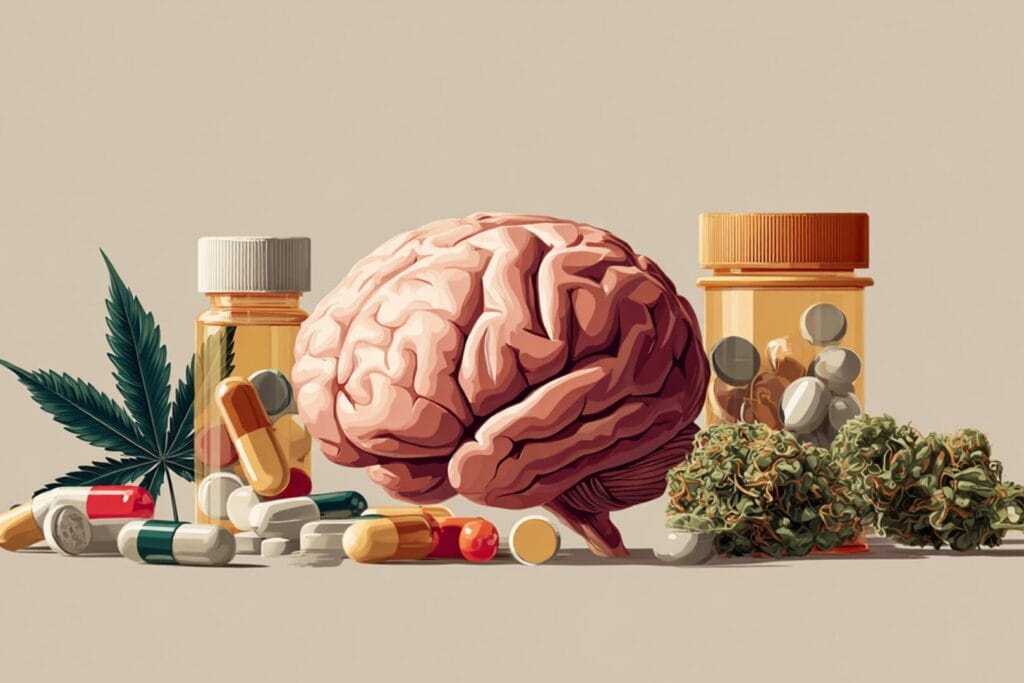Meditation can profoundly affect the path to overcoming addiction to drugs or alcohol. Meditation goes beyond being a way to relax or a spiritual practice. It can be a powerful tool to help you navigate the inevitable ups and downs in recovery.
Meditation draws from not only ancient wisdom but also modern science and can be foundational to rebuilding your life when it’s been affected by addiction.
With meditation, you can build inner strength that will help you navigate cravings, become more resilient, and create a new life in sobriety.
What Is Meditation?
Meditation is a practice where you work to train your mind to achieve focus, heightened awareness, and inner calm. There are a lot of different approaches you can use to meditate, but they share a common goal of helping you cultivate a deeper understanding of yourself and the world around you.
The core of meditation involves directing your attention inward using techniques like focused attention on your breath, repetition of a mantra, or visualization. In doing so, you can quiet the noise of your mind to observe your thoughts, emotions, and sensations without judgment.
Regular mindfulness practice can promote mental, physical, and emotional well-being.
Benefits include less stress and anxiety, enhanced emotional resilience, improved clarity and concentration, and inner peace and contentment.
How Meditation Works
Meditation combines neurological, physiological, and psychological mechanisms that interact, producing effects on the brain and body. The specific mechanisms vary depending on the type of meditation you practice, but some broad ways it works include:
- Different types of meditation can influence brainwave patterns. Practices like mindfulness meditation are associated with increased alpha and theta brainwave activity, focused attention, and relaxation.
- Meditation has been shown to promote neuroplasticity. This is the brain’s ability to reorganize and form new neural connections. Regular meditation leads to structural brain changes, especially in the regions associated with attention, self-awareness, and emotional regulation.
- When you practice meditation, it activates your stress response and counteracts the effects of chronic stress. Meditation can also lower levels of stress hormones like cortisol and can reduce heart rate and blood pressure.
- Meditation enhances emotional regulation by making you more aware of your feelings and less reactive. You learn to observe emotions without letting them overwhelm you.
- Training attention and concentration in meditation can improve cognitive function and task performance. Practicing sustained focus on a meditation object, like your breath, helps you stay more present in everyday life.
Meditation also cultivates self-awareness. You practice observing your thoughts, feelings, and sensations with curiosity and acceptance. Insight helps you learn more about your behavior, beliefs, and reactions, which can contribute to personal growth.
The Role of Meditation in Alcohol and Drug Addiction
Specifically, in terms of recovery from alcohol and drug addiction, meditation can play the following roles:
- Addiction recovery is stressful, and you’re facing triggers, cravings, and emotional challenges. Meditation can help you feel more relaxed during this time.
- A lot of people turn to drugs or alcohol to cope with complex emotions or to numb their feelings. Meditation can help you manage cravings and prevent relapse by developing healthier ways to respond to your feelings.
- In active addiction, there’s frequently a disconnect between your thoughts, emotions, and actions. You might behave impulsively without fully understanding what’s driving your behavior. Through meditation, you develop self-awareness that can help you make more intentional, thoughtful recovery choices.
- Mindfulness meditation relies on paying attention to the present moment with curiosity and openness. Through doing so, you can become more attuned to your physical sensations, urges, and thoughts that are linked with drug or alcohol cravings. You can recognize cravings as a temporary experience that will pass instead of being a powerful impulse you have to act on.
- Meditation can help you cope with physical and mental symptoms of withdrawal that occur in early recovery. You can use meditation to help alleviate symptoms like agitation, insomnia, and mood swings.
- When you’re recovering from addiction, it requires resilience so that you can learn from relapses, bounce back from setbacks, and stay committed to long-term sobriety. Meditation can help cultivate resilience and foster a sense of inner strength.
Meditation is a holistic part of addiction recovery that can help address physical substance dependence and also the underlying emotional, psychological and spiritual components of addiction. Meditation can become a tool to help you maintain your sobriety and build a purposeful life.
How Do You Meditate in Recovery?
A general framework of how to meditate in recovery includes the following:
- Begin each meditation session by setting clear intentions for your recovery journey. These intentions will guide your practice and help you stay focused.
- Find a comfortable posture where you’re alert but relaxed. You want to find a posture that promotes wakefulness without strain.
- Mindfulness of breath is one of the most influential and most straightforward meditation techniques. Close your eyes and pay attention to the sensation of breathing in and out. Notice your chest rising and falling or the air passing through your nostrils, and when your mind wanders, bring it back to the breath.
- Practice mindful awareness when cravings arise rather than acting on them impulsively. Observe the physical sensations, emotions, and thoughts, and notice where you feel the craving in your body.
- Recovery is challenging, and you may experience guilt and shame. You can practice self-compassion through the practice of meditation.
- Another option is the use of guided meditation that’s tailored to addiction recovery. These provide structured guidance and techniques that can help you.
- Be consistent with your meditation. Try including it into your daily routine, even just a few minutes.
Meditation is one tool in the recovery toolkit. It works best with treatment, including therapy, support groups, healthy lifestyle choices, and social support. Contact San Diego Detox to learn more about available treatment resources and programs.







